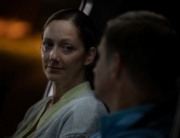
Rooney Mara in SIDE EFFECTS (Open Road Films)
![]() Steven Soderbergh has threatened for some time now to quit making movies. His latest, the medico-murder mystery Side Effects, is supposed to be his second to last film. If it is, it’s a fitting near-swan song to a strange career, and an artfully made pulp minorpiece, equal parts crowd pleasing and camp.
Steven Soderbergh has threatened for some time now to quit making movies. His latest, the medico-murder mystery Side Effects, is supposed to be his second to last film. If it is, it’s a fitting near-swan song to a strange career, and an artfully made pulp minorpiece, equal parts crowd pleasing and camp.
It’s true that the film, co-written by Contagion scribe Scott Z. Burns, doesn’t have a promising start. Martin Taylor (Channing Tatum, the hunky muse of Soderbergh’s last two pictures) gets out of prison for an insider trading conviction, but his ex-barmaid wife, Emily (Rooney Mara), is still depressed. She’s always been glum, and besides she hates the (far) Uptown Manhattan digs they were forced to move into after losing their Greenwich manse. (They’re seen in flashbacks dining al fresco on the lawn during happier times.) After she attempts suicide, a caring, if careerist, psychiatrist (an excellent Jude Law) prescribes her a new antidepressant, Ablixia. At first, it seems like it cures her depression, but then a very bad thing happens.
If you walked out at this point, you would think Side Effects was some kind of anti-psychiatry Erin Brockovich, a rather tired critique of the med-popping modern world that would have made the late psychiatry skeptic Thomas Szasz grin. There’s even a spoof ad for Zoloft, but the Ablixia stuff is not (primarily) satiric; it’s a red herring. Soon the film moves into airport paperback territory, with twists, turns, and cunning connivers.
In many ways the movie shouldn’t work, and for many viewers it won’t. Are there plot holes? Too many too count. Does it feature the most far-fetched, get-rich-quick-and-get-away-with-it scheme in the sordid history of cinema thrillers? Quite possibly. The film has a slightly rushed feel—a billboard for Snow White and the Huntsman in the background suggests it was shot last summer—and possibly as a result the performances are uneven. Mara is solid, and Law—balding and well past his pretty boy Mr. Ripley days—is actually almost great. Vinessa Shaw, on the other hand, as Law’s glamorous blonde wife, deserves a particular demerit for somehow stripping away the only dimension of her one-dimensional, stock character.
Some other faults can be explained away. In Emily’s suicide attempt, she crashes her car into the wall of a parking garage directly under the prominently lettered EXIT sign, and during a miserable yacht party, she looks up to see a distorted reflection of herself, arguably the laziest signal of mental anguish ever resorted to by a filmmaker. These trite visual clichés would be objectionable in another movie, but here I think it might actually be a clever trick. Soderbergh is trying to pull one over on you, and the clichés probably relax your guard.
It’s possible I’m being too lenient here, but it’s hard to deny you’ll have a good time. Soderbergh really has made a neat little B picture. A couple of years ago, when Soderbergh was promoting his God awful The Good German, I remember him giving an interview about how he wanted to be like Casablanca director and studio workhorse Michael Curtis, showing up at the lot one afternoon and getting assigned a musical, a war thriller, a period adventure yarn, what have you. With Side Effects, he has come close to his goal—turning out an impersonal product with style and wit. You can even imagine it’s the kind of thing that would be screened 50 years from now at some Film Forum retrospective on B movies of the 2010s. What compliment could be greater?
















Leave A Comment